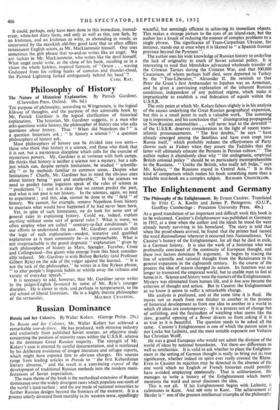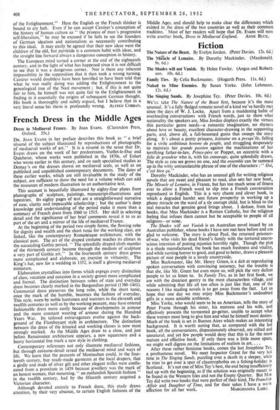The Enlightenment and Germany
Geoffrey Cumberlege : Princeton University Press. 40s.) As a good translation of an important and difficult work this book is to be welcomed. Cassirer's Enlightenment was published in Germany in 1932, at a time when the author and the ideals he stood for were already barely surviving in his homeland. The story is told that when the proof-sheets arrived, he found that the printer had turned the word Rationalismus wherever it occurred into Nationalismus. Yet Cassirer's history of the Enlightenment, for all that he died in exile, is a German history. It is also the work of a historian who was profoundly convinced of the continuity of European thought, and these two factors dominate Its argument. It begins by tracing the line of scientific and rational thought from the Renaissance to its general expansion in the eighteenth century. In the course of the process the idea of reason changed its nature. Its function was no longer to transcend the empirical world, but to enable man to feel at home in it. Science and history were the masters of the Enlightenment. Mystery was eliminated from human life, and le bon seas became the criterion of thought and action. But in Cassirer the Enlightenment as we know it seems to suffer a remarkable change.
His analysis is profound, and at the same time it is fluid. He moves not so much from one thinker to another in the process of historical development as from one idea to another in a world in which all ideas are contemporary. It is a process not of change but of unfolding, and the fascination of watching what seems like the slow, graceful opening of a flower diverts us from ,asking if it is as true as it is beautiful. The question needs to be asked all the same. Cassirer's Enlightenment is one of which the patron saint is not Locke but Leibnitz, and the most notable exponent not Voltaire but Christian Wolff.
He was a good European who would not admit the division of the world of ideas by national boundaries. Yet there are differences as well as similarities. It is valid to ask whether to place the Enlighten- ment in the setting of German thought is really to bring out jts true significance, whether indeed its spirit ever really crossed the Rhine. Even in Cassirer its rejection may be detected in the absence of the one word which no English or French historian could possibly have avoided employing continually. That is utilitarianism. He manages to write a history of the Enlightenment which barely mentions the wad and never discusses the idea.
This is not all. If his. Enlightenment begins with Leibnitz, it culminates in Kant. And Hitt only in Kant. The achievement of Herder is " one of the greatest intellectual triumphs of the philosophy
of the Enlightenment." Here the English or the French thinker is bound to cry halt. Even if he can accept Cassirer's conception of the history of human culture as " the process of man's progressive self-liberation," he may be excused if he fails to see the founders of German idealism and nationalism as necessarily contributing to this ideal. It may easily be agreed that their new ideas were the children of the old, but parricide is a common habit with ideas, and the straight line forward always a dangerous conception in history.
The European mind turned a corner at the end of the eighteenth century, and in the light of what has happened since it is not difficult to see that it was a dangerous corner. Nor is there any inherent impossibility in the supposition that it then took a wrong turning. Cassirer would doubtless have been horrified to have been told that what he was really doing was adding the Enlightenment to the genealogical tree of the Nazi movement ; but, if this is not quite fair to him, he himself was not quite fair to the Enlightenment in finding in it essentially the origins of subsequent German thought. His book is thoroughly and subtly argued, but I believe that in a very literal sense his thesis is profoundly wrong. ALFRED COBBAN.



































 Previous page
Previous page